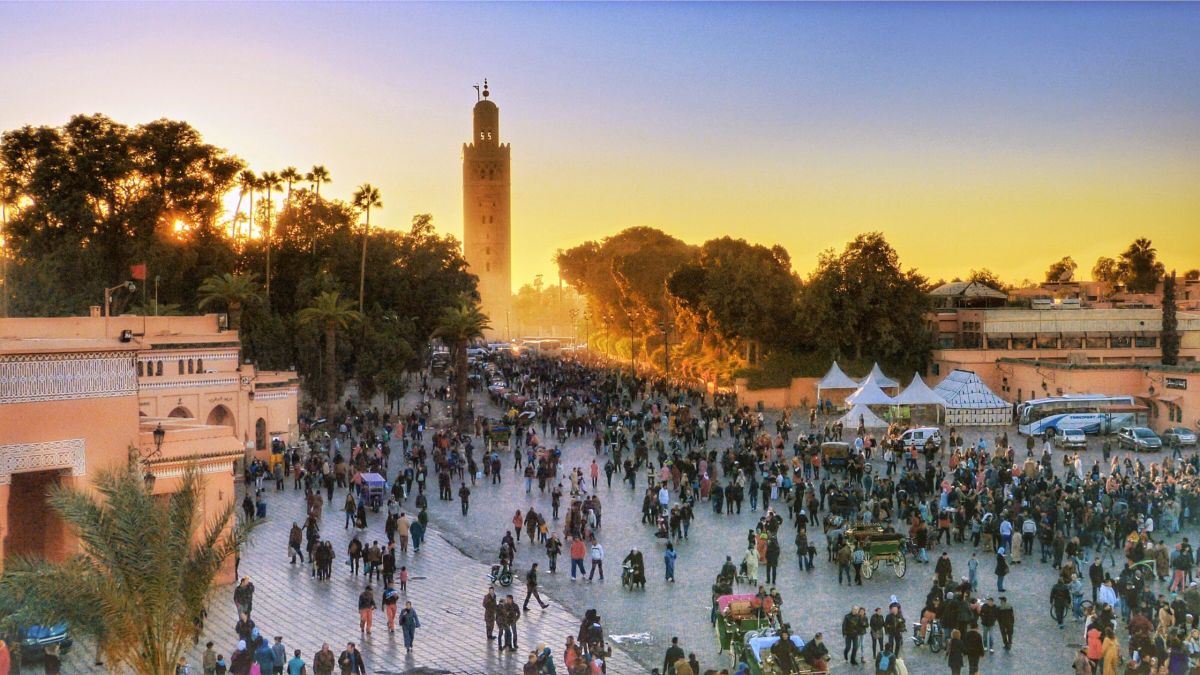Marrakech is a city where new interpretations of traditional designs emerge, most notably in handcrafted homewares.
Marrakech, Morocco is a city where new interpretations of traditional designs emerge, most notably in artisan handcrafted homewares. Piled high on tables in the city’s sprawling Medina, standard terracotta tagine pots and colorful woven lidded baskets are for sale. Versions of these traditional wares are also found on the shelves of Marrakech’s boutiques, along with contemporary cobalt blue vases, mouth-blown beldi glass tea cups and ceramic dinner settings with modern iterations on regional motifs.
Morocco’s exquisite craftsmanship and artisanry are intertwined with its rich history and continue to be a source of not only pride, but also income. The handicraft sector is 7% of Morocco’s GDP. While the country’s older generation of artisans might stick to traditional methods and patterns, passed down through the generations, many of Morocco’s younger artisans are blending these centuries old applications with contemporary themes.
Before visiting Marrakech’s tony boutiques, a stroll through the mind-boggling Medina, which dates back one thousand years, is an excellent place to get a general understanding of the varied handicrafts’ shapes, colors and regional styles. Homewares are for sale in the Medina’s plazas and shops, amid the crowded, sometimes chaotic pedestrian alleyways that are occasionally shared with donkeys pulling carts or a string of motorbikes.
Some merchants in the Medina, which measures just under 2,000 acres, indeed cater to tourists, selling a tagine pot for $5 to $20, but many shops are frequented by residents. Bargaining is common practice in the Medina, if you are game for a little good-natured sparring, try asking for a lower price. Or simply pay the pre-bargaining price and know that the extra few dollars, euros or dirhams can go a long way to support a merchant’s business.
Below, find four Marrakech shops that sell gorgeous homewares, blending the contemporary with touches of traditional artisan techniques.

MORO Marrakech
Rue Yves Saint Laurent, Majorelle
Set in from the street, the dark salmon-pink MORO Marrakech building stands amid a serene setting of palm trees, cacti and a pool, abutting the lush Jardin Majorelle. MORO is part of a boutique hotel, but the separate store has an airy interior space of two floors with potted trees. Customers might whiff faint notes of bergamot, citrus or sandalwood as they peruse the merchandise, as co-founders Mouad Mohcine and Mohcyn Bousfiha have an Essaouira-based skincare line The Moroccans, which sells in MORO.
Handmade terracotta pitchers, ceramic vases in matte cobalt blue, and big brass insects are a few of the crafts for sale displayed inside niches and old wooden cabinets; on shelves and tables. One of the owners makes a line of ceramic platters and bowls glazed with his loose line paintings of snakes, dragonflies or eyes. Up the spiral staircase on the second floor, one room is dedicated to selling classic handmade Moroccan rugs in various colorways (most are in muted tones with geometric patterns, of various dimensions). And interspersed throughout MORO are racks of men’s and women’s apparel by new designers, with a sprinkling of one-off vintage pieces.
The MORO has a superb outdoor café serving dishes like baba ganoush, spinach or seafood with rice in a flaky phyllo dough, or salads with grains like quinoa and fresh produce.

Chabi Chic
4 Rue Yves Saint Laurent, Majorelle
Down the street from the Yves Saint Laurent Museum and the Jardin Majorelle is Chabi Chic, a homeware store specializing in handcrafted Moroccan ceramics. Each dinner setting piece, platter, stemmed bowl, or set of tiny Moroccan cups are painted and/or engraved by hand. The exquisite patterns are inspired by Morocco’s vast array of regional floral and geometric designs. Chabi Chic’s pieces have an earthy palette of ocean blues and greens, moonstone grays and whites with an accent piece of perhaps orange or gold, all of which can easily be mixed and matched. A tagine pot might cost $19 to $58, depending on size; oval platters $34 to $46.
While Chabi Chic is a celebration of Morocco’s regional patterns and palettes, co-founders Vanessa Di Mino and Nadia Noël are originally from France. Prior to launching Chabi Chic in 2013, Di Mino was a practicing architect who came to Marrakech for work. She was so taken with Morocco that Marrakesh is now her home.
In addition to its central location on Rue Yves Saint Laurent, Chabi Chic has a sprawling showroom in the up and coming industrial neighborhood of Sidi Ghanem on 435 Quartier Industriel, about a 15 minute drive from the Majorelle neighborhood.

Soufiane Zarib
16 rue Sidi Ali Ben Hamdouch, Dar El Bacha
On the outskirts of the Medina on a heavily trafficked street next to a tire shop is the unassuming door to Soufaine Zarib, a boutique known for its handcrafted Moroccan rugs featuring both classic and contemporary designs.
It’s an understatement to say the proprietor, Soufiane Zarib, knows Moroccan rugs. Zarib grew up in the family business of rugs and has continued in his own way, combining traditional and contemporary elements with Moroccan rug making and retail.
One of the largest rooms in the multiple level store is dedicated to hundreds of one of a kind Moroccan rugs, folded in stacks or hanging on the wall, in every colorway imaginable. Soufiane Zarib’s rugs originate from various regions of Morocco, each having their own traditional palettes and intricate designs, made with handspun wool from local sheep. Zarib also designs his own contemporary rugs— some are almost psychedelic tie-dye in appearance. Prices vary wildly depending on size and type, from several hundreds to thousands of dollars.
Soufiane Zarib, a renovated riad, has multiple floors centered on a ground floor pool and a furnished rooftop terrace with city views. Although the boutique is known for rugs—Amazigh (Berber) and Boujad rugs, Tuareg mats—the retail space is dotted with Mid Century modern chairs, sofas and light fixtures and incorporates contemporary artisan homewares for sale.

Jajjah
114-116 Quartier Industriel, Sidi Ghanem
Upon entering Jajjah, which houses a boutique, tearoom with a cozy nook and gallery, one might be overwhelmed—in the best possible way. Glossy bright red is met with lime green and deep yellow, graphic patterns cover surfaces including the tile floor and the smell of fresh mint tea along with rhythmic Gnawa music on the sound system fill the air. In fact, shoppers might need to sit down, sip a cup of Jajjah’s signature tea blends and nibble on traditional Moroccan biscuits, before perusing the boutique’s shelves.
The founder, Hassan Hajjaj (the shop’s name is Hajjaj spelled backwards), is a world-famous photographer, known for vibrant portraiture that features iconic Moroccans in settings of bold colors and patterns. Hajjaj has previously expanded to designing his own apparel line, Andy Wahloo, as well as this more current collection of Moroccan inspired teas, biscuits and homewares. Jajjah is located in the industrial Sidi Ghanem, which has gradually turned into a trendy neighborhood.
The colorful Jajjah products on display, from woven cherry red caps and sneakers, to trays and yellow mugs, take aesthetic design cues from multiple sources. Ancient iconography, like the hand of Fatima (in fact, Jajjah’s logo is an upside-down hand of Fatima inside the eye) appears everywhere, as does an appreciation of Moroccan utilitarian graphics, with a dash of Andy Warhol-esque pop whimsy. In fact, there is an ode to Andy Warhol’s Campbell’s soup can, a giant lacquered metal canister with similar graphics but for the Moroccan Harira soup and “Andy Wahloo” is printed on the front.
Along with the wide variety of teas—Moroccan mint, chamomile orange—all the necessary accouterments like tea pots, lacquered tea tins, and metal cups with animal prints are for sale, ranging from $10 to $50. Metal picture frames and vases are also for sale, as are an assortment of messenger type shoulder bags and backpacks made from recycled plastic, including old industrial food shipping bags. Rotating photography exhibits are displayed in Jajjah’s tearoom and white-walled gallery space.
Source: Ob Server

















Add Comment